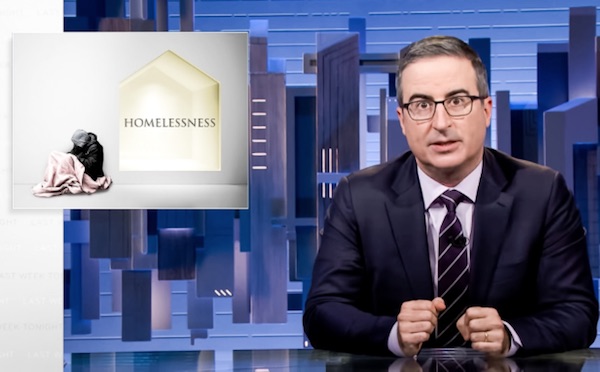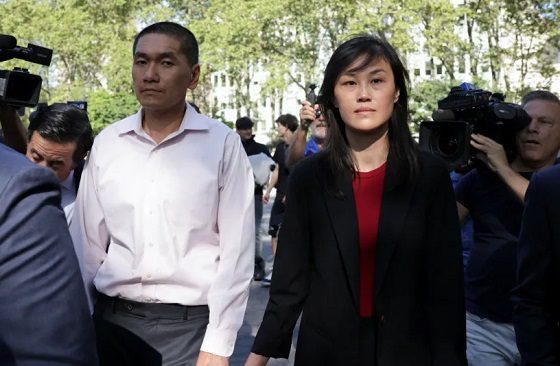Opinion
Why treating the Homesless as victims only makes the problem worse

This article is from Substack
Bestselling author Michael Shellenberger has just published a new book, “San Fransicko” about the homeless crisis in San Francisco. Shellenberger has lived in San Fransisco for 30 years. In “San Fransicko” Shellenberger argues one of the root causes of the homeless crisis sweeping cities all over America (and Canada) is the victimization of homeless people. In this article, Michael Shellenberger talks about the prevalent theory that homeless people are all victims as portrayed by TV Host John Oliver.
Why John Oliver Is Wrong About Homelessness
HBO TV Comedian Repeats Myth that the Homeless Are Just Poor People in Need of Subsidized Housing
The intelligent and hilarious HBO comedian John Oliver last night aired a 25-minute segment on homelessness. In it, he attributed homelessness to poverty, high rents, and NIMBY neighborhood activists who block new housing developments. Oliver showed interviews with homeless people who say they would like to work full-time but are unable to do so because they have to live in homeless shelters.
Unfortunately, Oliver’s segment repeated many myths that are easy to debunk. The vast majority of people we call “homeless” are suffering from serious mental illness, addiction, or both. We do a great job of helping mothers and others who don’t suffer from addiction or untreated mental illness to benefit from subsidized housing, but don’t mandate the psychiatric and addiction care that many “homeless” require. And the best-available, peer-reviewed science shows that “Housing First” agenda Oliver promotes fails on its own terms, worsens addiction, and is one of the main reasons homelessness has grown so much worse.
It’s true that we need more housing and voluntary addiction and psychiatric care, including what is called “permanent supportive housing” for people suffering from mental illness. In my new book, San Fransicko, I advocate for universal psychiatric care, drug treatment on demand, and building of more shelter space for the homeless. And Oliver is right that the U.S. lacks the social safety net that European and other developed nations have.
But Oliver badly misdescribes the problem. For example, he notes that some cities lack sufficient homeless shelter. But he doesn’t acknowledge that it has been “Housing First” homelessness advocates who caused the lack of shelter by demanding that funding be diverted to apartments often costing $750,000 each.
And Oliver promotes policies that have made addiction, mental illness, and homelessness worse. He claims homelessness causes addiction when it is far more often the other way around. And Oliver completely ignores the overwhelming body of scientific research showing that using housing as a reward for abstinence, rather than giving it away as a right, is essential to reducing homelessness by reducing addiction.
Oliver was wrong to encourage more of the same policies that caused homelessness to increase in the U.S. over the last decade, but also wrong for suggesting that anyone who disagreed with him were racist and NIMBY “dicks” who cause violence against homeless people. Oliver closes his segment by ridiculing a white woman who expresses concern about subsidized housing bringing the homeless into her neighborhood.
Why is that? Why does such an intelligent, thoughtful, and compassionate journalist repeat easily-debunked myths about homelessness?
Part of it is just ignorance. Oliver appears to have relied entirely on Housing First advocates and not read anything that questions their narrative. As I document in San Fransicko, homeless advocates are not just small service providers but major academics at top universities including Columbia University and University of California, San Francisco. Those “Housing First” advocates have received hundreds of millions in grants from Marc Benioff, John Arnold, George Soros, and other donors to promote the notion that Housing First works.
Another part of it is ideological. Housing First advocates believe that housing, not shelter, is a right, and that governments have a moral obligation to provide it. They have spent 20 years trying to prove that giving away housing to addicts and the mentally ill works, but the studies show that it fails to address addiction and thus even keep people in apartments at higher rates than other methods. The only thing proven to work is to make housing a reward for good behavior, mostly abstinence but also things like taking one’s psychiatric medicines, and going to work.
The dominant view among progressives of homelessness, drugs, and mental illness stems from victim ideology, which was born in the 1960s. Starting in the late 1960s, progressives attacked any effort to hold people who receive welfare or subsidized accountable as “blaming the victim.” Today, many progressives even view drug dealers as victims.
Victim ideology categorizes people as victims or oppressors, and argues that nothing should be demanded of people categorized as victims. This is terrible for the mentally ill, who often need to be coerced into taking their medicines, so they don’t end up breaking the law, hurting people or themselves, and winding up in prison. And this is terrible for addicts, who need to be arrested, when breaking laws related to their addiction, such as public drug use, shoplifting, and public defecation.
In the end, Oliver’s 25 minute segment on homelessness is a perfect encapsulation of victim ideology and why it is so wrong on both the facts and on ethics. On the facts, Oliver misdescribes a homeless woman who is likely suffering from mental illness and/or drug addiction as merely down on her luck. And Oliver mixes together apparently sober and sane homeless families, temporarily down on their luck, with people are on the street because of addiction and untreated mental illness. Doing so is wrong, analytically, but also wrong, morally, since most addicts and the mentally ill need something very different from just a subsidized apartment unit.
If we are to solve homelessness rather than make it worse, we need intelligent and thoughtful comedians and influencers like Oliver to do their homework, rather than to repeat myths. I researched and wrote San Fransicko, in part, to make it easier for people to get the facts, rather than repeat what we were told, and to see that there’s a better way to help the homeless, whether addicted to drugs, mentally ill, or not.
The good news is that the conversation around drugs and homelessness is changing rapidly because the situation on the ground has grown so much worse. Environmental Progress and the California Peace Coalition are at the very beginning of our efforts to educate journalists, policymakers, and the public. And San Fransicko was published just three weeks ago.
As time passes, many Americans will see the consequence of treating what is fundamentally a problem of untreated mental illness and addiction as a problem of poverty, high rents, and NIMBYs. And some of them, perhaps even comedians like John Oliver, will come to find humor, and humility, from the fact that so many of us got it so wrong.
Artificial Intelligence
UK Police Pilot AI System to Track “Suspicious” Driver Journeys
AI-driven surveillance is shifting from spotting suspects to mapping ordinary life, turning everyday travel into a stream of behavioral data
|
|
Business
Judge Declares Mistrial in Landmark New York PRC Foreign-Agent Case

U.S. District Judge Brian Cogan declared a mistrial Monday afternoon in the high-profile foreign-agent and corruption case against former New York state official Linda Sun and her husband Chris Hu, after jurors reported they were hopelessly deadlocked on all 19 counts.
After restarting deliberations Monday morning with an alternate juror, the panel sent a note to Judge Cogan stating:
“Your honor, after extensive deliberations and redeliberations the jury remains unable to reach a unanimous verdict. The jurors’ positions are firmly held.”
Cogan brought the jury into court and asked the foreman whether they had reached agreement on any counts. They replied that they were deadlocked on every one. The judge then declared a mistrial.
Assistant U.S. Attorney Alexander Solomon immediately told the court that the government intends to retry the case “as soon as possible.” A status conference is scheduled for January 26, 2026, to determine next steps.
Jury selection began November 10, 2025, and the government called 41 witnesses to the stand, compared with eight for the defense and one rebuttal witness for the prosecution. Deliberations began on December 12, and by this afternoon the jurors had sent three notes to the court — each indicating deadlock.
As The Bureau reported in its exclusive analysis Friday, the panel’s fracture had become visible as jurors headed into a second week of deliberations in a landmark foreign-agent and corruption trial that reached into two governors’ offices — a case asking a jury of New Yorkers to decide whether Sun secretly served Beijing’s interests while she and Hu built a small business and luxury-property empire during the pandemic, cashing in on emergency procurement as other Americans were locked down.
Prosecutors urged jurors to accept their account of a dense web of family and Chinese-community financial transactions through which Sun and Hu allegedly secured many millions of dollars in business deals tied to “United Front” proxies aligned with Beijing. The defense, by contrast, argued that Sun and Hu were simply successful through legitimate, culturally familiar transactions, not any covert scheme directed by a foreign state.
Sun and Hu face 19 charges in total, including allegations that Sun acted as an unregistered foreign agent for the People’s Republic of China; visa-fraud and alien-smuggling counts tied to a 2019 Henan provincial delegation; a multimillion-dollar pandemic PPE kickback scheme; bank-fraud and identity-misuse allegations; and multiple money-laundering and tax-evasion counts.
Prosecutors have argued that the clearest money trail ran through New York’s COVID procurement scramble and a pair of Jiangsu-linked emails. In closing, Solomon told jurors that Sun’s “reward” for steering contracts was “millions of dollars in kickbacks or bribes,” contending the money was routed through accounts opened in Sun’s mother’s name and via friends and relatives.
The government has tied those claims to a broader narrative — laid out in Solomon’s summation and dissected in The Bureau’s reporting — that Sun functioned as a “trusted insider” who repurposed state access and letterhead to advance Beijing’s priorities, including by allegedly forging Governor Kathy Hochul’s signature on invitation letters used for Chinese provincial delegations, while keeping those relationships hidden from colleagues. The defense, in turn, urged jurors to reject the government’s picture of clandestine agency and argued prosecutors had overreached by treating ordinary diaspora networking, trade promotion, and pandemic procurement as criminal conduct — insisting none of the evidence proved the “direction or control” element central to the Foreign Agents Registration Act.
Whether a future jury will see the same evidence as corruption and covert foreign agency or as culturally familiar commerce and politics — will now be tested again, on a new timetable, in a courtroom that has already shown just how difficult this record is to unanimously interpret.
The Bureau is a reader-supported publication.
To receive new posts and support my work, consider becoming a free or paid subscriber.
-

 Alberta2 days ago
Alberta2 days agoAlberta’s huge oil sands reserves dwarf U.S. shale
-

 Energy2 days ago
Energy2 days agoCanada’s sudden rediscovery of energy ambition has been greeted with a familiar charge: hypocrisy
-

 Alberta2 days ago
Alberta2 days agoCanada’s New Green Deal
-

 Business2 days ago
Business2 days agoCOP30 finally admits what resource workers already knew: prosperity and lower emissions must go hand in hand
-

 Business2 days ago
Business2 days agoOttawa Pretends To Pivot But Keeps Spending Like Trudeau
-

 Agriculture9 hours ago
Agriculture9 hours agoWhy is Canada paying for dairy ‘losses’ during a boom?
-

 Indigenous2 days ago
Indigenous2 days agoResidential school burials controversy continues to fuel wave of church arsons, new data suggests
-

 Automotive1 day ago
Automotive1 day agoFord’s EV Fiasco Fallout Hits Hard










